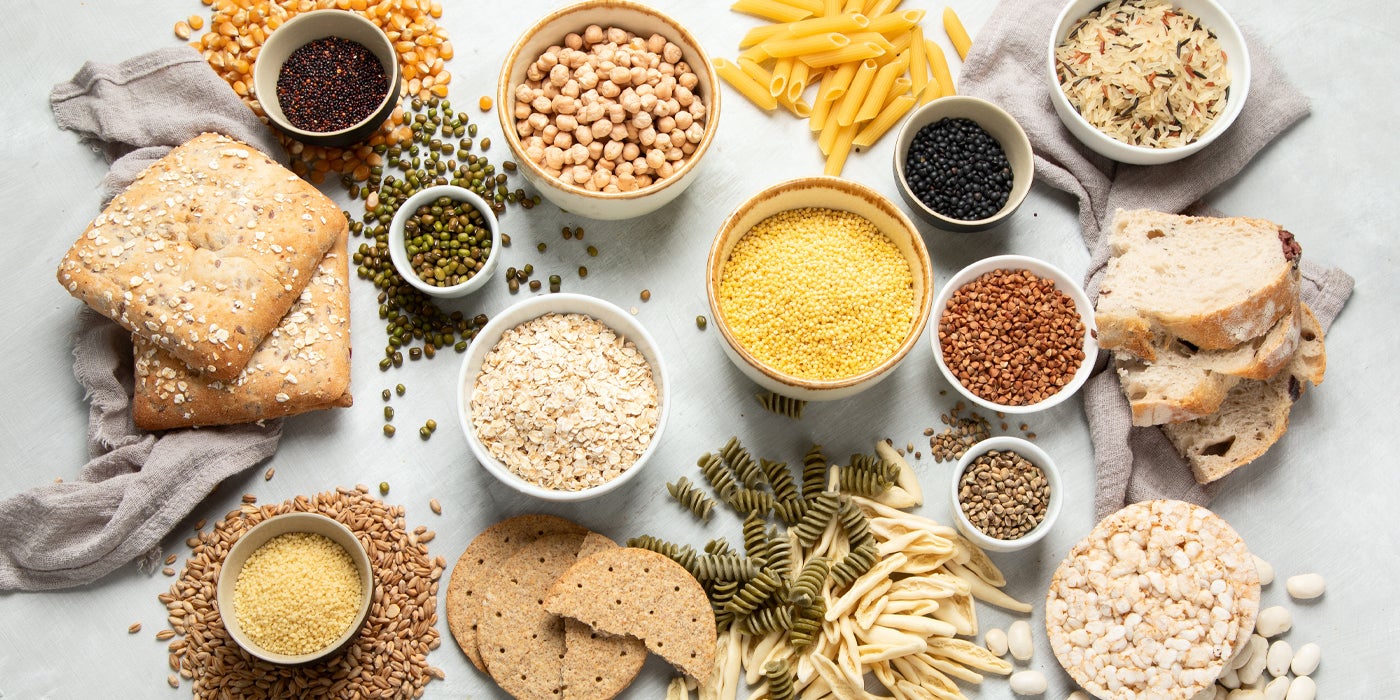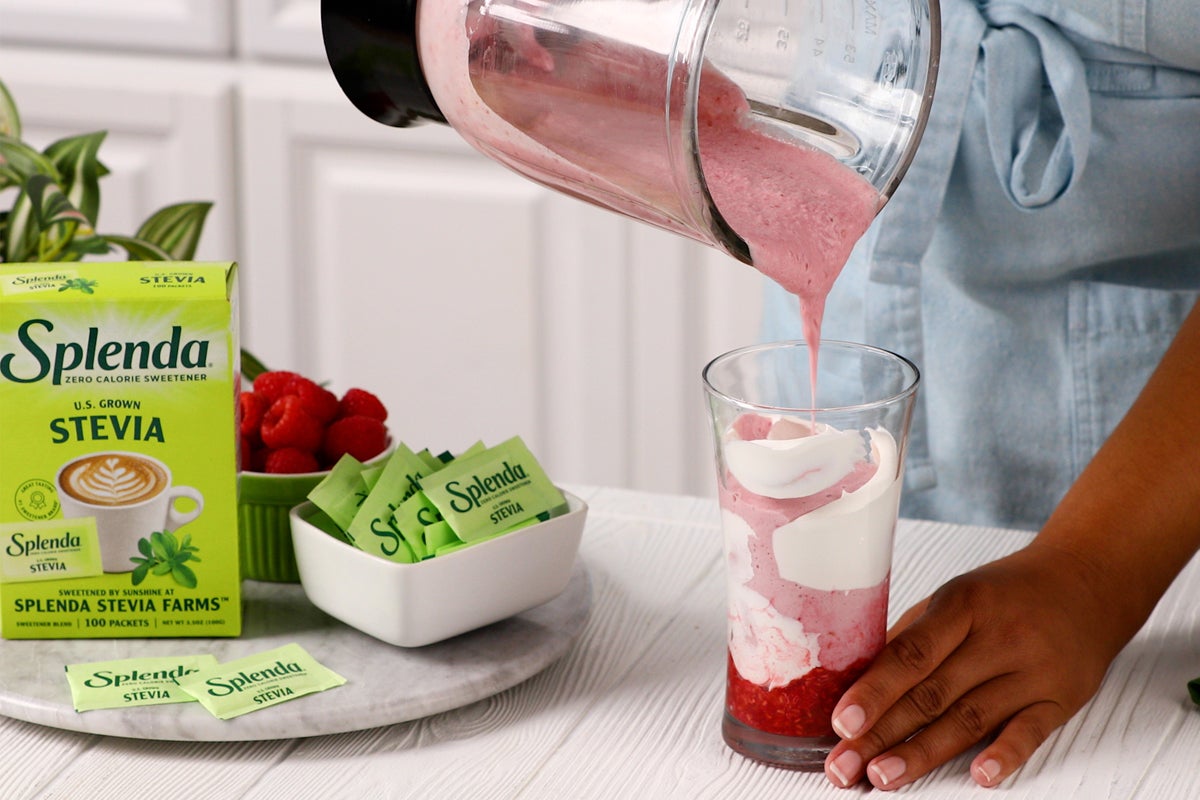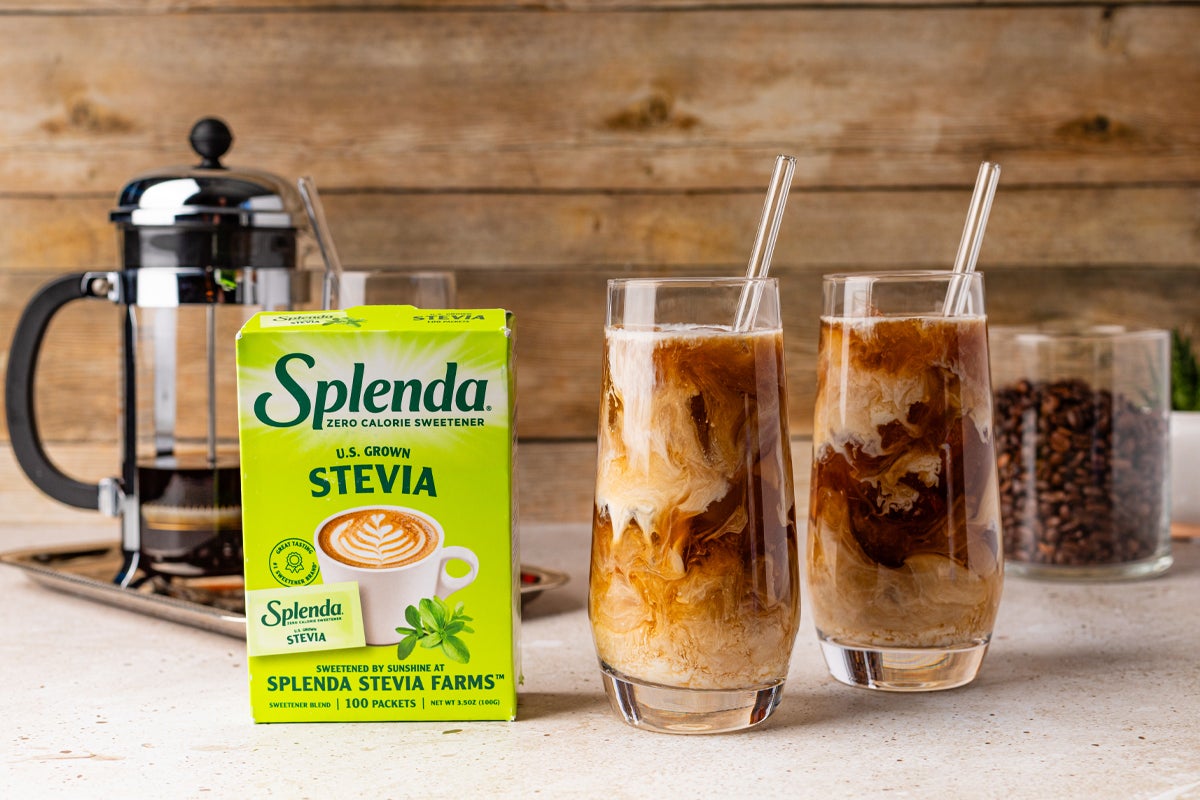Are Carbs Bad for You? Understanding and Dispelling Myths
August 26, 2024
Carbohydrates (aka carbs) often get a bad rap. They’re blamed for weight gain and accused of being inherently unhealthy. The truth is that not all carbs are created equal, and their health impact can vary greatly depending on their type, the amount consumed, how they’re paired with other foods, and your overall health.
Continue reading to learn more about carbohydrates and how they can fit into a healthy diet.
What Are Carbohydrates?
Carbohydrates are one of the three macronutrients (along with proteins and fats) that humans need to consume. They’re primarily found in plant-based foods, including:
- Starches: Beans, lentils, bread, pasta, rice, quinoa, chips, pretzels, popcorn, pancakes, waffles, etc.
- Fruits: Apples, bananas, berries, grapes, melon, dried fruit, fruit juices, etc.
- Nonstarchy veggies: Asparagus, broccoli, cabbage, carrots, cauliflower, green beans, mushrooms, etc.
- Starchy veggies: White potatoes, sweet potatoes, corn, peas, butternut squash, acorn squash, parsnips, yams, etc.
- Milk, milk substitutes, & yogurt: fat-free or low-fat milk, flavored yogurt, Greek yogurt, soy milk, etc.
- Sweets and desserts: Brownies, candy, cake, cookies, ice cream, pies, etc.
- Sugar: Table sugar, brown sugar, molasses, honey, etc.
What Do Carbohydrates Do in the Body?
The carbohydrates you eat are broken down into glucose during digestion and then absorbed into the bloodstream. This increase in blood glucose levels triggers the pancreas to release insulin, a hormone that helps cells absorb glucose and use it for energy.
Types of Carbohydrates
There are two main types of carbohydrates:
Complex Carbohydrates
Complex carbohydrates are made up of long chains of sugar molecules linked together. These include foods like whole grains (e.g., oats, whole wheat, and brown rice), legumes (beans, lentils), and starchy vegetables (potatoes, sweet potatoes).
These carbs are characterized by their high fiber content, which slows digestion and the absorption of sugar. This helps maintain stable blood sugar levels, which benefits overall energy levels and metabolic health. Complex carbs are also packed with health-boosting nutrients such as vitamins, minerals, and antioxidants.
Simple Carbohydrates
Simple sugars consist of short-chain carbohydrates that are quickly digested and absorbed into the bloodstream. These include glucose, fructose, and sucrose found naturally in fruits, honey, and milk but are also added to many processed foods in the form of table sugar or high-fructose corn syrup.
Foods high in added simple sugars spike blood sugar levels rapidly, leading to a quick burst of energy followed by a sharp decline, often referred to as a “sugar crash.” Regular consumption of high amounts of simple sugars is linked to various health issues, including weight gain, type 2 diabetes, heart disease, and cognitive decline.
Dietary Fiber
Often considered a subset of complex carbohydrates, dietary fiber is a type of carb that the body cannot digest. Found in whole grains, nuts, seeds, fruits, and vegetables, fiber is vital for digestive health. It helps slow the absorption of sugar into the bloodstream, aids in digestion, and plays a role in preventing diseases such as diabetes, heart disease, and colorectal cancer.
Carbs and Their Impact on Blood Sugar: Why It’s Important to Consider
The relationship between carbohydrates and blood sugar is a critical aspect of nutrition that affects overall health. Regulating blood sugar levels is key for maintaining steady energy levels and preventing hunger spikes, which can help in weight management. Consistently high blood sugar levels can also lead to insulin resistance (a precursor to type 2 diabetes) and can damage blood vessels, nerves, and organs over time.
Eating the right kinds of carbohydrates in the right combinations can contribute to more stable blood sugar levels, reduce the risk of diabetes, and support overall metabolic health.
The Plate Method for Balancing Blood Sugar
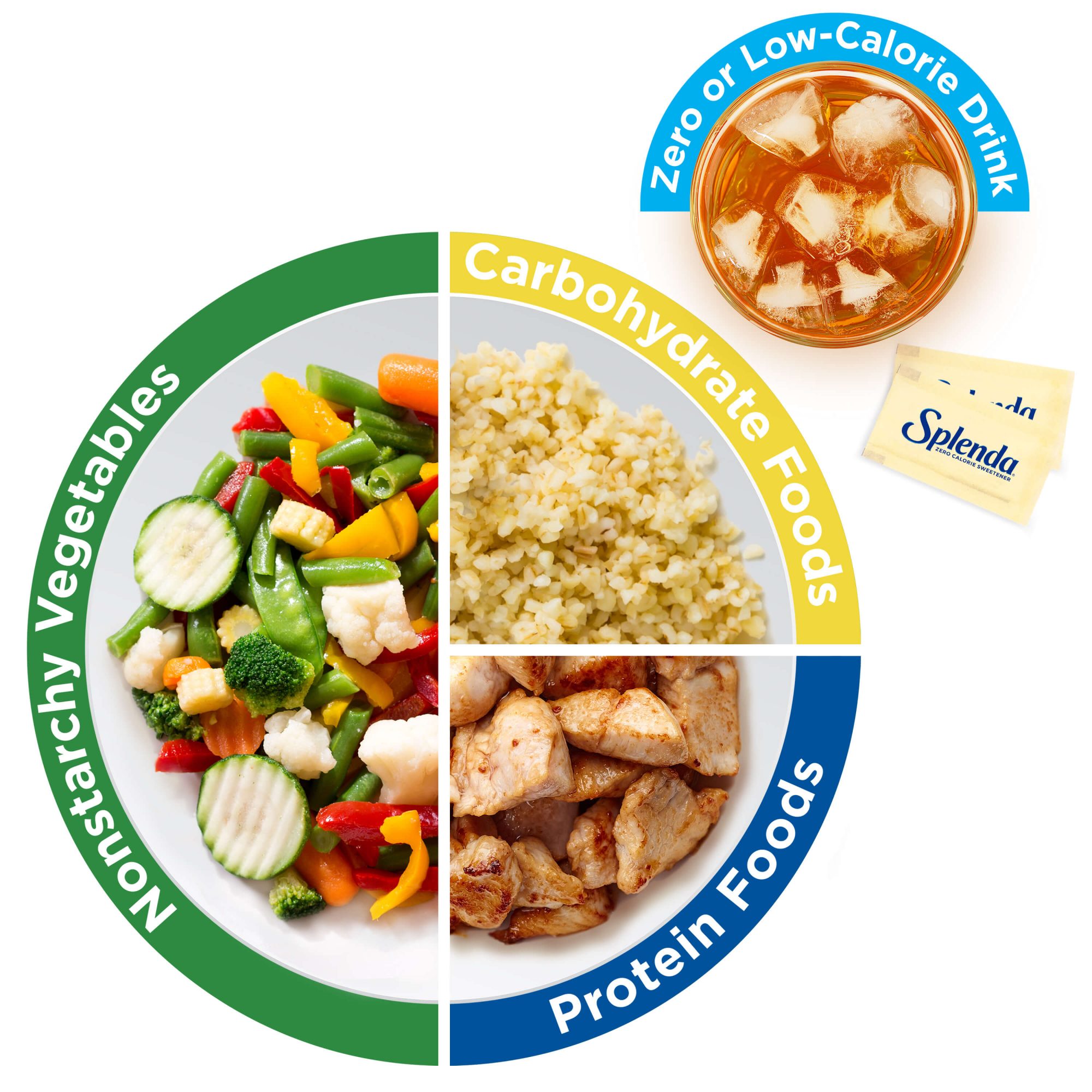
So, how exactly do you include carbs in your diet in a healthy way? Enter The Plate Method, a simple strategy for building a balanced meal that can help manage your blood sugar.
Here’s how to build a balanced, blood sugar-friendly meal:
- Step 1: Grab a medium-sized plate.
- Step 2: Fill half the plate with non-starchy veggies, such as green beans, broccoli, cauliflower, carrots, and salad. These veggies have minimal calories and carbohydrates. Keep in mind that you don’t have to eat your veggies plain. Add flavor with herbs, spices, or a Splenda® sweetener. A great example is this Asparagus with Sesame-Ginger Sauce side dish made with Splenda Granulated Sweetener.
- Step 3: Fill one-quarter of the plate with a lean protein, such as chicken, turkey, salmon, or tofu. It’s best to use healthy cooking methods like baking or grilling instead of pan or deep frying. This Baked Salmon with Ginger-Citrus Sauce made with Splenda Granulated Sweetener would be a healthy protein option.
- Step 4: Fill one-quarter of the plate with carb foods. Carb foods include grains, starchy vegetables, fruit, and certain dairy products (milk and yogurt). This German Potato Salad made with Splenda Granulated Sweetener would be a good choice. (Those with diabetes may benefit from carb counting.)
Avoid or Reduce Your Consumption of Added Sugars
Added sugars are simple carbs that are considered “empty calories” because they provide calories but little to no nutritional value. They’re added to food products to enhance sweetness and are commonly found in food products like dressings, sauces, desserts, yogurt, soda, cereals, soups, and protein bars. Added sugars spike blood sugar levels rapidly and are one of the main ingredients driving the obesity and diabetes epidemic.
There are at least 61 different names for sugar on food labels, making it crucial to recognize these aliases and do your best to avoid them. Some of the most common include:
- Sucrose
- Fructose
- Glucose
- Lactose
- High-fructose corn syrup
- Corn syrup
- Agave nectar
- Cane sugar
- Cane syrup
- Dextrose
- Invert sugar
- Maltose
- Honey
- Brown sugar
- Corn sweetener
- Maple syrup
- Fruit juice concentrates
- Molasses
- Barley malt syrup
- Evaporated cane juice
Is Fruit Bad for You?
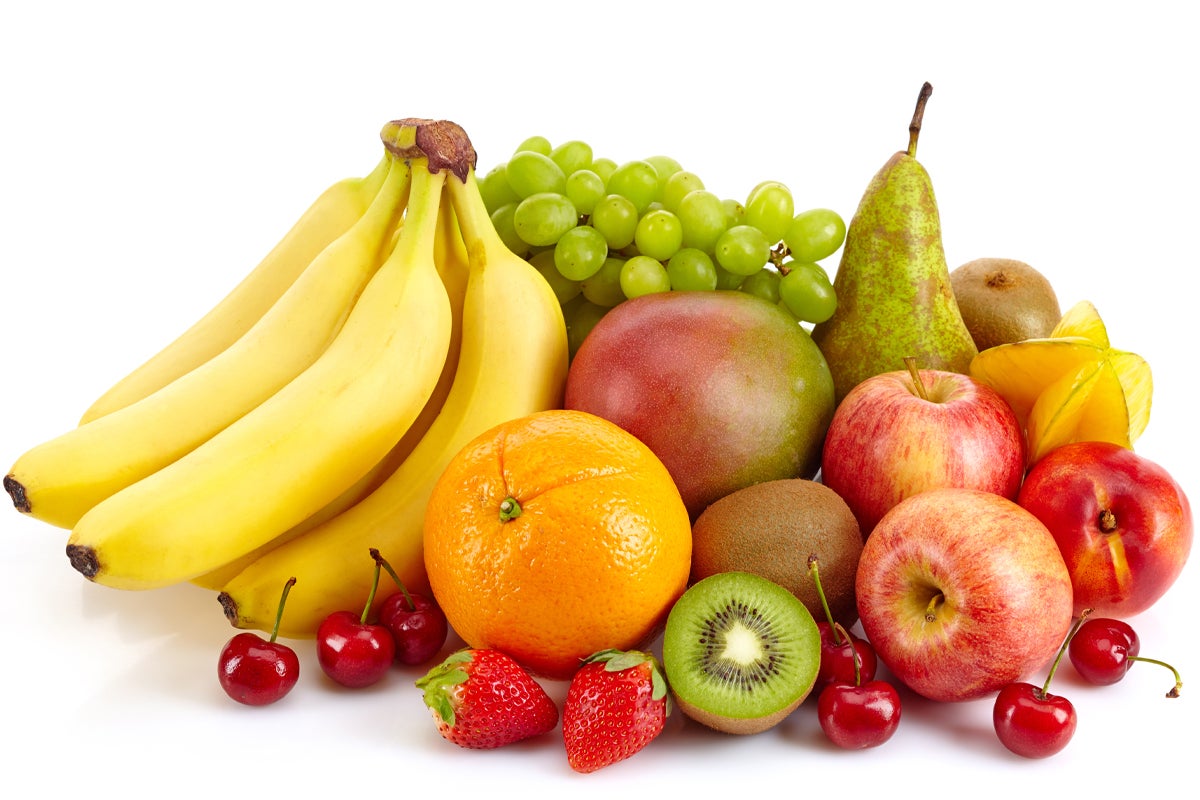
One question people often have when considering carbohydrates is fruit. Fruit primarily contains simple carbs, specifically natural sugars such as fructose and glucose. However, fruits are also rich in dietary fiber, vitamins, minerals, and antioxidants.
The fiber in fruit helps moderate the effects of the natural sugars on blood sugar levels, providing a more steady energy release than foods with added sugars that lack fiber. You can further slow the absorption of fruit sugar by eating it with a bit of fat — for example, an apple with a tablespoon or two of peanut butter.
Fruit juice, on the other hand, lacks the fiber that helps regulate the absorption and effects of these sugars. As a result, consuming fruit juice can lead to quicker spikes in blood sugar levels than eating whole fruits. As such, fruit juice should be limited, especially if you have pre-diabetes or diabetes.
How Low-Calorie Sweeteners Can Help Reduce Simple Carb Intake
Replacing added sugar with low or no-calorie sweeteners like Splenda Original Sweeteners and Splenda Stevia Sweeteners offer a strategic way to enjoy sweetness without adverse effects. Here’s why incorporating sugar substitutes into your diet can be beneficial:
- Blood sugar management: Unlike regular sugar, low- and no-calorie sweeteners do not cause a surge in blood sugar and insulin levels. This is particularly advantageous for those with diabetes or insulin resistance, as it allows for better control over blood sugar levels while still enjoying sweet flavors in food and beverages.
- Weight management: By substituting sugar with low- and no-calorie sweeteners, you can reduce the overall calorie content of your diet, potentially aiding in weight loss or maintenance. Since obesity is a risk factor for many chronic diseases, including type 2 diabetes and cardiovascular disease, managing calorie intake with the help of low-calorie sweeteners can contribute to overall health.
- Dental health: Low- and no-calorie sweeteners do not contribute to tooth decay, as they’re not fermentable sugars that oral bacteria can use. This is a significant advantage over sugar, which can contribute to cavities and other oral health problems.
Are Carbs Bad for You? Wrapping It Up
The question of whether carbohydrates are bad for you has been a topic of much debate. However, as we’ve explored, the answer is not a simple yes or no. Carbohydrates are a diverse group of nutrients that play essential roles in your health. The key is understanding the different types of carbohydrates and making informed choices about which ones to include in your diet and how. Here’s a summary to help wrap up our discussion:
- Carbohydrates include simple carbs and complex, each of which affects the body differently.
- Simple sugars can cause quick spikes in blood sugar, whereas complex carbohydrates provide more sustained energy and help maintain stable blood sugar levels due to their fiber content.
- Whole, unprocessed carbohydrates like fruits, vegetables, legumes, and whole grains offer vital nutrients and fiber, contributing to digestive health, reducing the risk of chronic diseases, and helping to manage weight.
- Including a variety of carbohydrates in your diet is beneficial, but balance and moderation are key.
- Foods high in added sugars contribute to a variety of health issues, including obesity, type 2 diabetes, and cardiovascular disease. Do your best to eliminate or cut back on added sugars.
Low- and no-calorie sweeteners like Splenda Original Sweeteners or Splenda Stevia Sweeteners provide the sweetness of sugar without the associated calories and blood sugar spikes. They can be helpful tools for managing diabetes, aiding in weight control, and improving overall health.
Written by Katie Koschalk, a health and wellness writer, certified holistic nutritionist, and certified personal trainer based in California.

